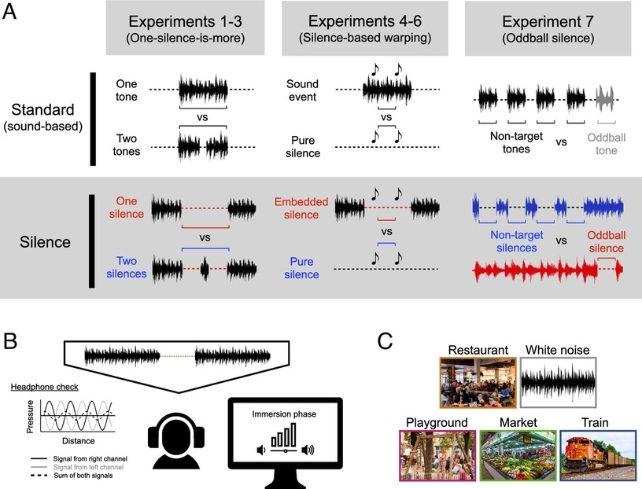Since the days of Aristotle, scientists and philosophers have debated whether silence is ever 'heard'. A new series of experiments by researchers from Johns Hopkins University in the US may just have settled the issue.
The research made clever use of a well-known trick called the one-is-more illusion, which fools the brains of listeners into thinking two discrete sounds are shorter than one single sound, even though in reality the total time is the same.
Replacing sounds with silence, the team found that the illusion still worked. You can try it out for yourself. A single continuous silence is perceived as being longer than two separate silences, despite them actually being the same duration overall.
"Silence, whatever it is, is not a sound – it's the absence of sound," says Rui Zhe Goh, a graduate student in philosophy and psychology from Johns Hopkins University. "Surprisingly, what our work suggests is that nothing is also something you can hear."
The researchers posit that because we're reacting to silence in the same way as sound in these tricks, we're truly hearing that silence – not just inferring that it's there. It seems as though Simon & Garfunkel were on to something.
A total of 1,000 participants were recruited across seven experiments. As well as the one-is-more illusion, other similar tests were carried out, covering partial silences and silences that varied in how close together or far apart they were.
Background noises like busy restaurants and train stations were used the frame the silences for some experiments, for others there were variances in tones.

Throughout all of the experiments, the effects were the same: silence was apparently processed in the same way as sound. The study adds to our increasing knowledge about how our sense of hearing functions.
"The kinds of illusions and effects that look like they are unique to the auditory processing of a sound, we also get them with silences, suggesting we really do hear absences of sound too," says Ian Phillips, a a philosopher and psychologist at John Hopkins University.
Many studies now show that silence can be important in perceiving sounds – like the way we leave pauses between words – but until this point there hasn't been any solid experimental evidence that silence itself can serve as a stimulus that the brain hears.
Next, the team wants to look at how we might perceive silence if it is totally disconnected from sound (and not embedded in it, as in these experiments). It also raises the question of whether or not we ever experience perfect silence, and could help in the treatment of various hearing problems.
"Philosophers have long debated whether silence is something we can literally perceive, but there hasn't been a scientific study aimed directly at this question," says Chaz Firestone, a cognitive scientist at John Hopkins University.
The research has been published in PNAS.
